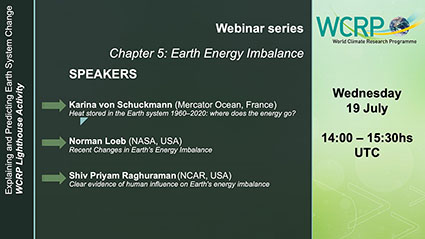- Details
Early bird registration for the WCRP Open Science Conference (23-27 October 2023) has been extended to 25 July 2023. This will be the final date for participants to register at a reduced rate for the standard conference registration. Pre-registration for side events with a limited number of participants is also open now.
- Details
You are warmly invited to the second webinar in the series on “Actionable Climate Knowledge” hosted by the Argentinean Hub of the WCRP My Climate Risk Lighthouse Activity. This webinar will focus on the study of climate storylines and will have simultaneous interpretation in Spanish/English. For more information and the link to register, please click the heading above.
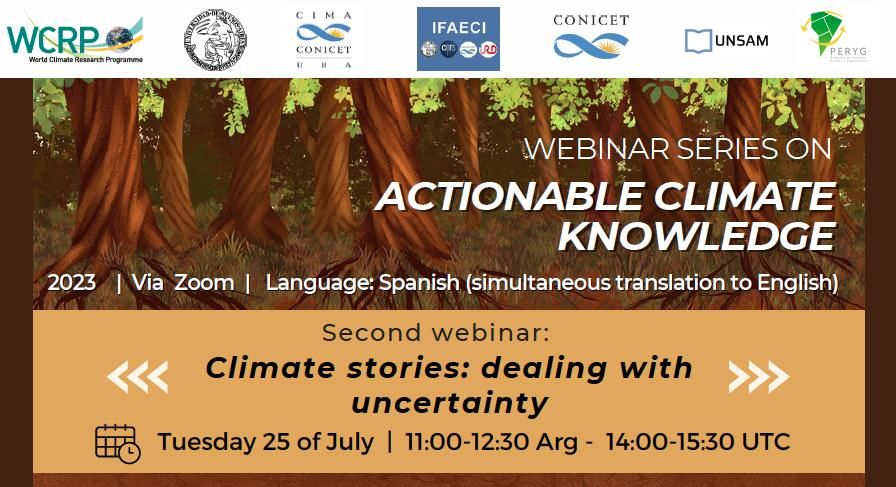
- Details
The WCRP Explaining and Predicting Earth System Change Lighthouse Activity invites you to join the 5th webinar of the series that will provide a discussion forum on topics focused on predicting and explaining a range of different climate phenomena and events, while supporting the further development of a scientific agenda. This fifth webinar will focus on recent changes and the human influence on the Earth Energy Imbalance.
SPEAKERS:
- Karina von Schuckmann (Mercator Ocean, France): Heat stored in the Earth system 1960–2020: where does the energy go?
- Norman Loeb (NASA, USA): Recent Changes in Earth’s Energy Imbalance
- Shiv Priyam Raghuraman (NCAR, USA): Clear evidence of human influence on Earth's energy imbalance
The event will take place on Wednesday 19th July 2023, from 14:00hs to 15:30hs UTC.
Registrations are free and can be done via https://EPESC-webinar-Earth-Energy-Imbalance.eventbrite.co.uk
- Details
The deadline for applications to the vacancy for the Director of the ESMO International Project Office, hosted by hosted by DKRZ in Hamburg, Germany, has been extended to 21st July.
The ESMO International Project Office (IPO) will provide overall support for the planning and implementation of the ESMO priorities and ensures appropriate international coordination and communication between the ESMO Scientific Steering Group (SSG), groups within their structure, and collaboration with related WCRP and other international programmes.
For more details about the ESMO position and how to apply, click here.
- Details
The program includes plenary presentations, a full lineup of keynote and oral speakers, and a schedule for lunchtime and evening side events. We will hear the latest from the experts on a wide range of topics, from seasonal forecasting to irreversible changes in the climate system.
Planning your trip to Rwanda for the WCRP Open Science Conference 2023? Take a look at the many sightseeing opportunities at https://wcrp-osc2023.org/practical-information/sightseeings!
See the Conference website for more information: https://wcrp-osc2023.org/

- Details
We invite you to attend the webinar: How do we address climate risk? Challenges from an interdisciplinary dialogue on 27 June, 11:00-12:30 Arg (14:00-15:30 UTC). This webinar is the first one in a series called "Actionable Climate Knowledge" from the Argentinean Hub of the WCRP My Climate Risk Lighthouse Activity. For more information and to register, click the heading above.

- Details
Polar scientists are calling for an urgent intensification of national and international research and observational capabilities in view of rapid Arctic and Antarctic change. The latest call to action is from the SCAR/CliC Expert Group on Antarctic Sea-Ice Processes & Climate (ASPeCt) and the CliC Arctic Sea Ice Working Group (ASIWG) in response to continuing observations of record low sea-ice extents, with the same messages heard strongly at the Antarctic Treaty Consultative Meeting that concluded in Helsinki last week.
Photo: Petra Heil (Australian Antarctic Program)
- Details
Three exciting leadership opportunities in WCRP International Project Offices (IPOs). WCRP invites applications for the posts of:
- Director of the CLIVAR (Climate and Ocean - Variability, Predictability, and Change) IPO, hosted by the Ocean University of China (OUC) in Qingdao, China
- Director of the RIfS (Regional Information for Society) IPO, hosted by Ouranos in Montreal, Canada
- Director of the ESMO (Earth System and Modelling Observations) IPO, hosted by DKRZ in Hamburg, Germany
The IPOs provide overall support for the planning and implementation of Core Project priorities and ensures appropriate international coordination and communication between their Scientific Steering Group (SSG), groups within their structure, and collaboration with related WCRP and other international programmes.
The director will assemble a team, define the IPO’s identity, and fulfill its mandate.
- More details about the CLIVAR position and how to apply, click here. – Deadline 30 June 2023
- More details about the RIfS position and how to apply, click here– Deadline 26 June 2023
- More details about the ESMO posiotn and how to apply, click here – Deadline 30 June 2023
For more details, click on the heading above.
- Details
'Cumulonimbus flammagenitus', or as they are more commonly known 'Pyrocumulonimbus' (pyroCb), is the name given to thunderstorms that form in the smoke plumes of fires. These large plumes of smoke are generated during massive fires on the Earth's surface, nuclear bomb blasts, and volcanic eruptions. When they reach a certain magnitude, they can generate large vertical clouds that cause meteorological phenomena such as electrical storms and tornadoes, in some extreme cases. In the case of a forest fire, the intense heat source generates hot air that rises upwards due to convection, and there is a mixing of gases and smoke particles. Energy is released through the condensation of water vapour, leading to the formation of a cumulus cloud from the smoke plume. In some cases, these clouds can develop into a thunderstorm, where ice particles can help to create lightning which in turn increases the risk of generating more and larger fires.

- Details
The Technical Report published by the Joint Research Center (JRC), the European Commission's science and knowledge service, provides evidence-based scientific support showing the impacts of the emerging drought that has been visible in Europe during the winter and spring months. Based on the observation of Combined Drought Indicators (CDI). These indicators combine meteorological, hydrological and biophysical variables captured by satellites as well as the temporal and spatial scales of the indicator and the geographical area where they occur, attempting to explain the drought conditions associated with impacts on available water sources.
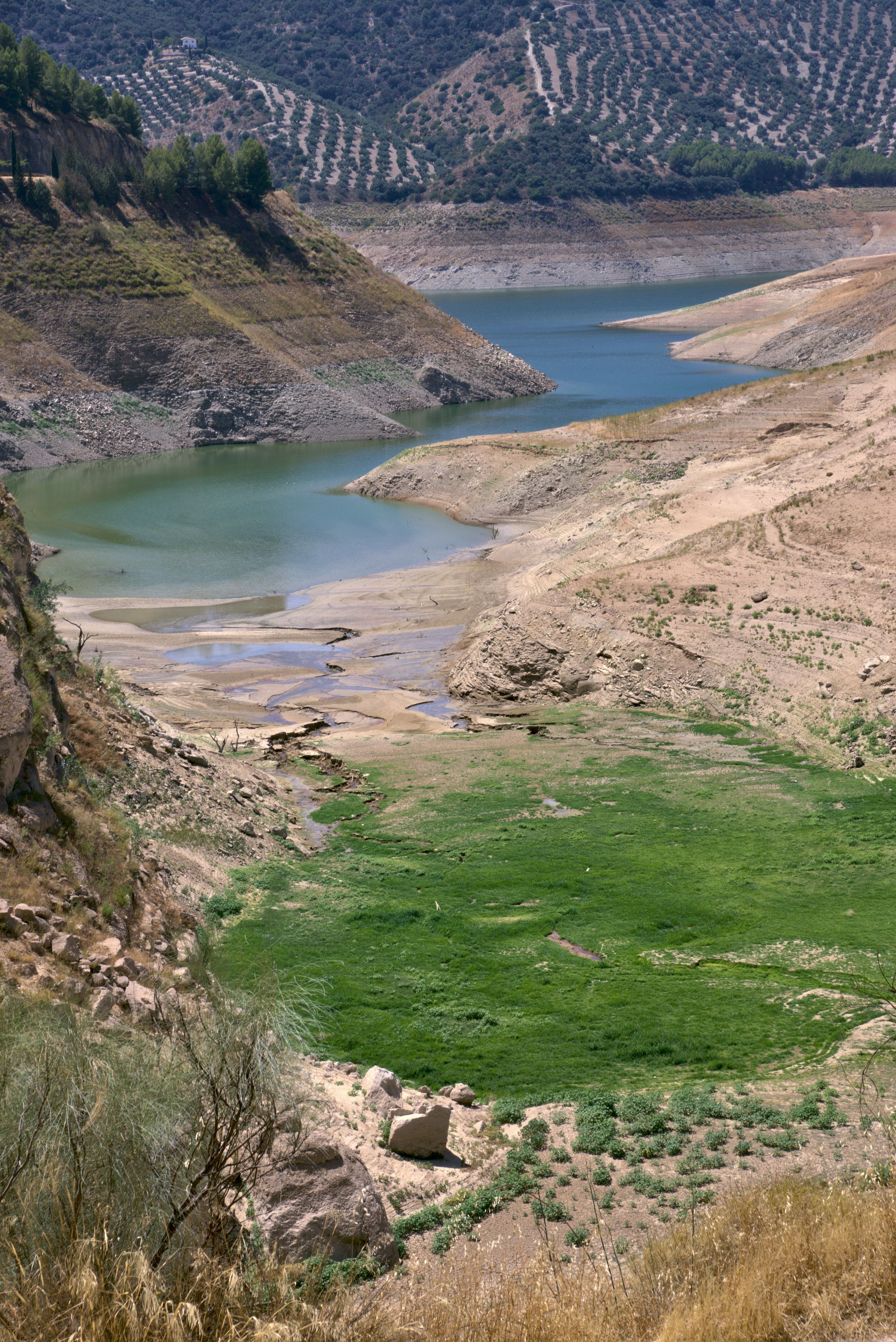
The CDI's provide an effective comparison to assess how the evolution of drought occurs over a given period of several years. The Global Drought Observatory in Europe published in March 2023, compares how the end of the winter season has been this year and the two previous years. The comparative shows that in the late winter months in 2021 the CDI's maintained normal conditions. However, in 2022 the indicators showed 'warming conditions' mainly in the southern regions of Europe. In contrast, in 2023, the indicators show that drought is affecting Central and Western parts of Europe. The three countries that have triggered the most warnings about the strongest impacts of drought on their water resources, agriculture and energy production are Italy, France and Spain. Significant evidence of drought has also been seen at the end of the winter season and in many cases has continued to trend through the spring months in Ireland, the UK, Switzerland, most of the Mediterranean islands, Black Sea regions such as Bulgaria, Romania and Greece.
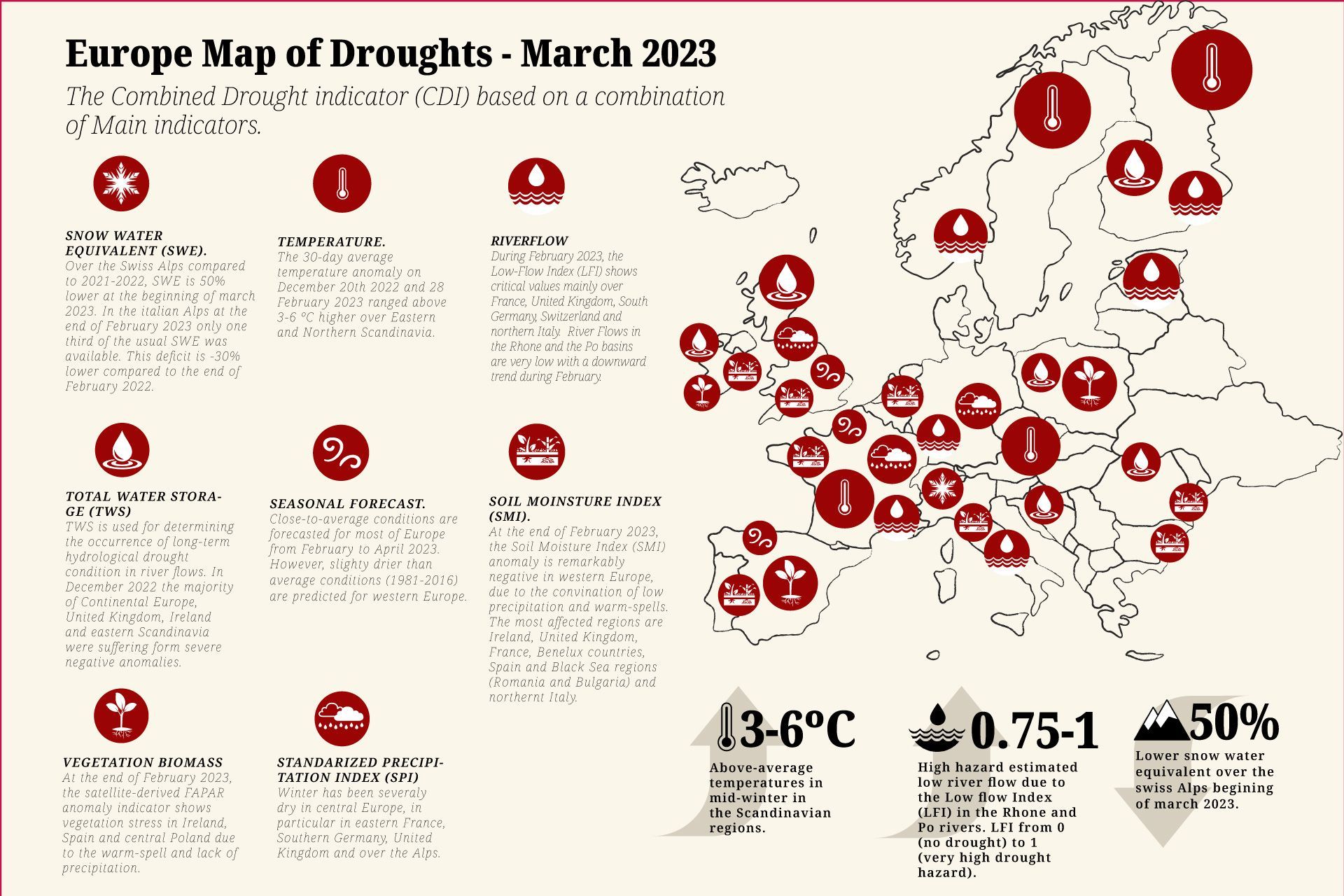
The Standardized Precipitation Index (SPI) shows the anomalies produced by the lack of precipitation compared to the usual average. In this case the SPI analyses the cumulative records over a 12-month period. The conclusion is that many parts of Europe have been accumulating negative or visibly below-average precipitation records over the last year. The year 2023 has started with anomalies in most of France, Germany, northern Italy, northern Poland and the Black Sea coast. The Temperature indicator shows the prolonged above-average temperatures occurring during the different seasons, compared to pre-industrial parameters. Between the period of late 2022 and early 2023, many regions of Europe have experienced high mid-winter temperatures, with Central Europe and eastern Scandinavia experiencing temperatures 3 to 6 °C above average. The UK, on the other hand, has experienced one of the warmest and driest winters in its history.
The most effective way to quantify the assessment of snow water resources is through the Snow Water Equivalent (SWE). It represents the amount of water stored at the top of the mountains. Comparing 2022-2023 with respect to the previous decade of 2011-2021, there have been periods during the winter season where only one third of the usual SWE was available. The Soil Moisture Index (SMI) together with the Total Water Storage (TWS) is used to determine long-term hydrological drought conditions. It also often serves as a proxy for the amount of groundwater available. Low precipitation records and above average warm temperatures show low soil moisture indicators especially in Western Europe in countries such as Spain, France, the UK, Italy, among others. Satellite records of vegetation stress in Europe are studying the loss and availability of Vegetation Biomass. Southern Spain is particularly vulnerable and may be at increased risk of drought and vegetation loss during the summer months, after having experienced an extremely hot April, reaching temperatures of 38°C.

The evolution of river flow is another important indicator of the progress of the drought. As rivers are one of the most important water sources, it is determined by the River Flow Index (SLI). There are some areas in Europe, such as the Rhone and Po basins, where critical river flow values are expected to be reached by 2023. The Global Drought Observatory Analytical Report in early March reflected extremely warm conditions across Europe which have continued to record anomalies in CDI (Lack of precipitation and warmer-than-average temperatures) in central and southern regions during May 2023. Close monitoring is required to understand the impacts expected for the coming growing season.
Bibliography.
Global Drought Observatory Analytical Report. Toreti, A., Bavera, D., Acosta Navarro, J., Arias-Muñoz, C., Avanzi, F., Marinho Ferreira Barbosa, P., De Jager, A., Di Ciollo, C., Ferraris, L., Fioravanti, G., Gabellani, S., Grimaldi, S., Hrast Essenfelder, A., Isabellon, M., Jonas, T., Maetens, W., Magni, D., Masante, D., Mazzeschi, M., Mccormick, N., Meroni, M., Rossi, L., Salamon, P. and Spinoni, J., Drought in Europe March 2023, EUR 31448 EN, Publications Office of the European Union, Luxembourg, 2023, ISBN 978-92-68-01068-6, doi:10.2760/998985, JRC133025.
- Details
We are delighted to announce that the registration is open for the WCRP Open Science Conference, that will be held in Kigali, Rwanda, and online on 23-27 October 2023.
Register online following the instructions available at https://wcrp-osc2023.org/registration.
- Deadline for Early Bird registration: 15 July 2023
- Accommodation: Preferential rates have been secured for the WCRP Open Science Conference delegates at hotels in Kigali, to book your hotel room click here
To know more about the WCRP Open Science Conference, please see the website.
- Details
WCRP is delighted to announce that the International CLIVAR Project Office (ICPO) is now being hosted by the Ocean University of China, Qingdao, after being hosted by the First Institute of Oceanography (FIO), Ministry of Natural Resources of China for almost nine years. WCRP thanks FIO for its outstanding contributions to facilitating international ocean research. The ICPO will continue its strong support to ensure CLIVAR’s mission to understand the dynamics, the interaction, and the predictability of the climate system with emphasis on ocean-atmosphere interactions.
For more details, click on the heading above.
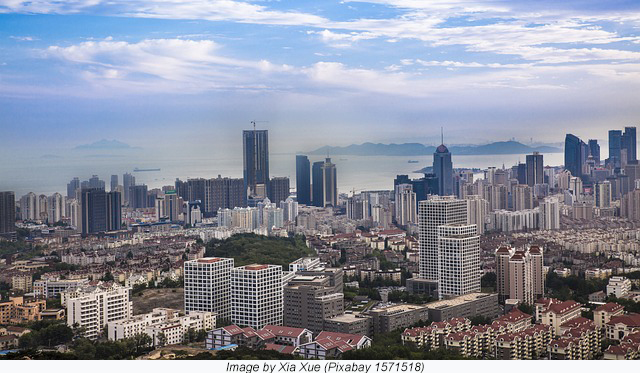
- Details
WCRP is delighted to announce that the German Climate Computing Center (DKRZ) has been selected to host the new International Project Office (IPO) of the Earth System and Modelling Observations (ESMO) Core Project.
For more details, check the press release on the DKRZ website.

- Details
WCRP is seeking two interns, commencing 1 June 2023 (or at an agreed time) for a period of up to 12 months in Geneva, Switzerland. The deadline for applications is 11 May 2023. For further information and to apply, click the heading above.

- Details

The WMO State of the Global Climate Report 2022 focuses on key climate indicators (greenhouse gases, temperatures, sea level rise, ocean and heat acidification, sea ice, and glaciers). It highlights the impacts of climate change and extreme weather events. This year, the WMO team has launched a process to gather feedback on State of Climate reports to see how they can be improved in the future.
- Details
The deadline for the open call for proposals to host the Stratosphere-troposphere Processes And their Role in Climate (SPARC) International Project Office has now been extended until 31 May 2023. Click the heading above for full information and the application package.
- Details
We are seeking new members for two of the WCRP Safe Landing Climates Lighthouse Activity Working Groups: Perturbed Carbon Cycle and Safe Landing Pathways. The deadline for self-nominations is extended to 16 April 2023. Full information is available on the open call webpage.

- Details
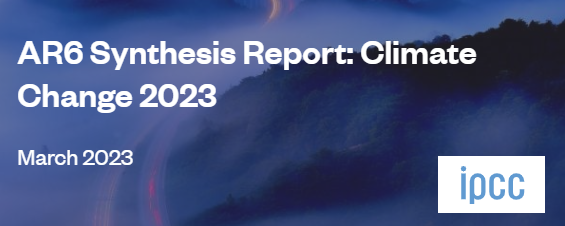
The sixth assessment report (AR6 Synthesis Report) of the Intergovernmental Panel on Climate Change (IPCC) is available from 20 March 2023. It follows the same methodology as previous reports, based on a compilation of bilateral research papers. The final synthesis has been compiled from a cycle of reports that have been developed and published over the last few years. This report sets the tone for what the race against climate change will look like over the next decade and shows the most important points on which policy-makers should focus. See the full document here.
- Details
The Coupled Model Intercomparision Project (CMIP) encourages all ongoing and new Model Intercomparison Project (MIP) (CMIP6-endorsed MIPs and others) leads to register information about their MIP through a MIP registration form, both to reduce duplication of effort across MIPs and modelling centres and to foster collaboration. MIP registration will also allow the CMIP panel to obtain useful information for the design of CMIP7 and provide the climate science community with information on activities being carried out at the global level. MIP information will be made available publicly on the CMIP website in due course. There is no deadline for registration, but early engagement is encouraged.

- Details

28 March 2023, ECMWF, Reading (UK)
This symposium, organized by the WCRP Working Group on Subseasonal to Interdecadal Prediction (WGSIP), aims to highlight cutting-edge developments occurring in the international research and services communities.
The symposium is open to all interested researchers and practitioners in the international climate prediction community, either remotely or (for those based in Reading) in person at ECMWF. If you would like to attend, please complete the registration form before 26 March to receive the joining information.
- Details
The National Institute of Health (NIH) is building its climate change and health research portfolio with funding opportunities to develop Climate Change and Health Research Centers. This program will support the development of an innovative research environment to foster and sustain a transdisciplinary program of fundamental and applied research to explore the complex impacts of climate change on health and to develop action-oriented strategies that protect health and build resiliency at the individual, community, national and global levels.
More information on the funding opportunity "Exploratory Grants for Climate Change and Health Research Center Development (P20 Clinical Trial Optional) - RFA-ES-23-007"
- Application Receipt Date(s): May 1, 2023; November 7, 2023
- Institutions from around the world are eligible to apply
- Resources and partnership information to assist in developing robust and relevant research projects and core activities: https://www.niehs.nih.gov/research/programs/climatechange/research_program/p20/
- The NIH will hold an informational webinar/Q&A session on March 24, from 1:00pm-3:00pm EDT on Zoom. Registration is required at: https://nih.zoomgov.com/webinar/register/WN__5Qj2le4SxqHg9QrCMkcew
- Details
March 2023

October 2023 meet us in Kigali, Rwanda!
In this issue of World Climate Research Programme (WCRP) Insights, we focus on the WCRP Open Science Conference. The deadline is fast approaching to submit your abstract to the WCRP Open Science Conference (OSC) that will be held in Kigali, Rwanda from 23 October to 27 October 2023.
- Details
The WCRP Earth System Modelling and Observations (ESMO) Core Project coordinates, advances, and facilitates all modelling, data assimilation and observational activities within WCRP, working jointly with all other WCRP projects and providing strategic connections to related external programs. It follows a seamless and value chain approach across all Earth system components, disciplines, and scales. The modelling and observational activities under ESMO are central to the provision of science-based climate information to support adaptation planning and decision-making, local and regional climate impact assessments, and national and international mitigation and adaptation policies. ESMO was officially launched by the WCRP Joint Scientific Committee in November 2020.
This call invites the community to nominate candidates (including self-nomination) to become members of the ESMO Scientific Steering Group (SSG).
If you are interested in joining the SSG, please submit your application via the online form by the new deadline: 26 March 2023.
Please direct inquiries about the nomination and selection process to Nico Caltabiano (
For more information, click the heading above
- Details
The WCRP ‘My Climate Risk’ Lighthouse Activity welcomes several new hubs from around the globe into its international network – and more are expected to join soon. The new hubs will add to the interdisciplinary exchanges around the issue of context-specific climate risks through exciting and diverse activities that we have already seen from the established hubs.

- Details
We are pleased to announce that the deadline for abstract submission, financial support applications, and requests to participate in the Early to Mid-Career (EMCR) Symposium has been extended to 14 March 2023. To help the organizing committee, please do not leave your submissions until the last minute. Please see the abstract submission webpage for more information.




